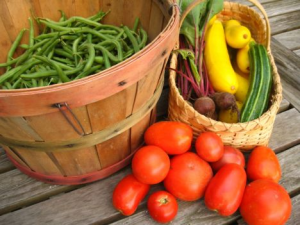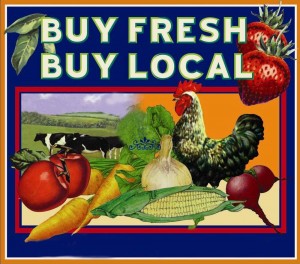Healthy You: Healthy Planet!
By Sabrina Harper, Sustainability Director of Dining Services
Eating well incorporates many different factors. Quality can be a multi-faceted adjective to describe food. Wholesome food is good for your body and mind. Wholesome can also describe food that is grown, caught, raised and processed locally and naturally.

What are the benefits of eating locally?
- Locally-grown produce is usually tastier because it was picked at its peak ripeness and landed on your plate not too long after that. When produce travels long distances, it is often gassed to retard the ripening process.
- Locally-grown produce often comes from smaller more sustainable farms, which means it may be grown organically, using less pesticides and fertilizers, and using seeds which are not genetically modified or altered.
- Large food production can be prone to outbreaks of Salmonella and E.Coli. By supporting smaller, locally-grown producers and growers, you are less at risk.
- Eating locally means eating seasonally. If you’ve ever gone strawberry picking, you know the difference between strawberries flown in from Mexico and a juicy fresh-picked strawberry right off the bush.
- Local food has a lower carbon footprint, which means it is better for the environment. Less miles traveled means less carbon emissions to contribute to global climate change.
- Eating locally supports the local economy. On far-traveled produce, farmers normally only see $.20 or less of each dollar you spend on fresh produce. The rest goes to distribution, transportation, marketing, packaging and refrigeration. Also, by supporting local agriculture, you help preserve farmland and open spaces and protect it from development.
How can you get all this local food you may ask? Try stopping by the Boston University Farmers Market in season (August-October) and subscribing to the Ward’s Berry Farm CSA. You can also enjoy local food in all the dining halls and the GSU. While the New England climate can be a challenge for year-round agriculture, you can find greenhouse-grown tomatoes from Madison, Maine all year. You can also find alfalfa sprouts, bean sprouts, potatoes, squash, and apples almost year-round. In season, look out for local cucumbers, eggplant, zucchini, yellow squash, cabbage, peppers, nectarines, peaches, pears, and more! Local dairy is also available all over campus in the dining halls and retail locations in the form of milk, butter, sour cream, ice cream and more. Healthy You, Healthy Planet!
Join Sabrina and fellow BU students at the Sustainability Town Hall Meeting Tonight (12/1/10) at 5 PM in CAS Room 216. Also at 7 pm tonight Slow Food BU is hosting a lecture “The Locavore Way” by local author Amy Colter at BU Central.
Do you try to eat more local or sustainable food?
